NAVIGATING THE NEXT CHAPTER
A roadmap for long-term life planning for yourself , your aginglovedones , and the nextgeneration
SPONSORED BY:



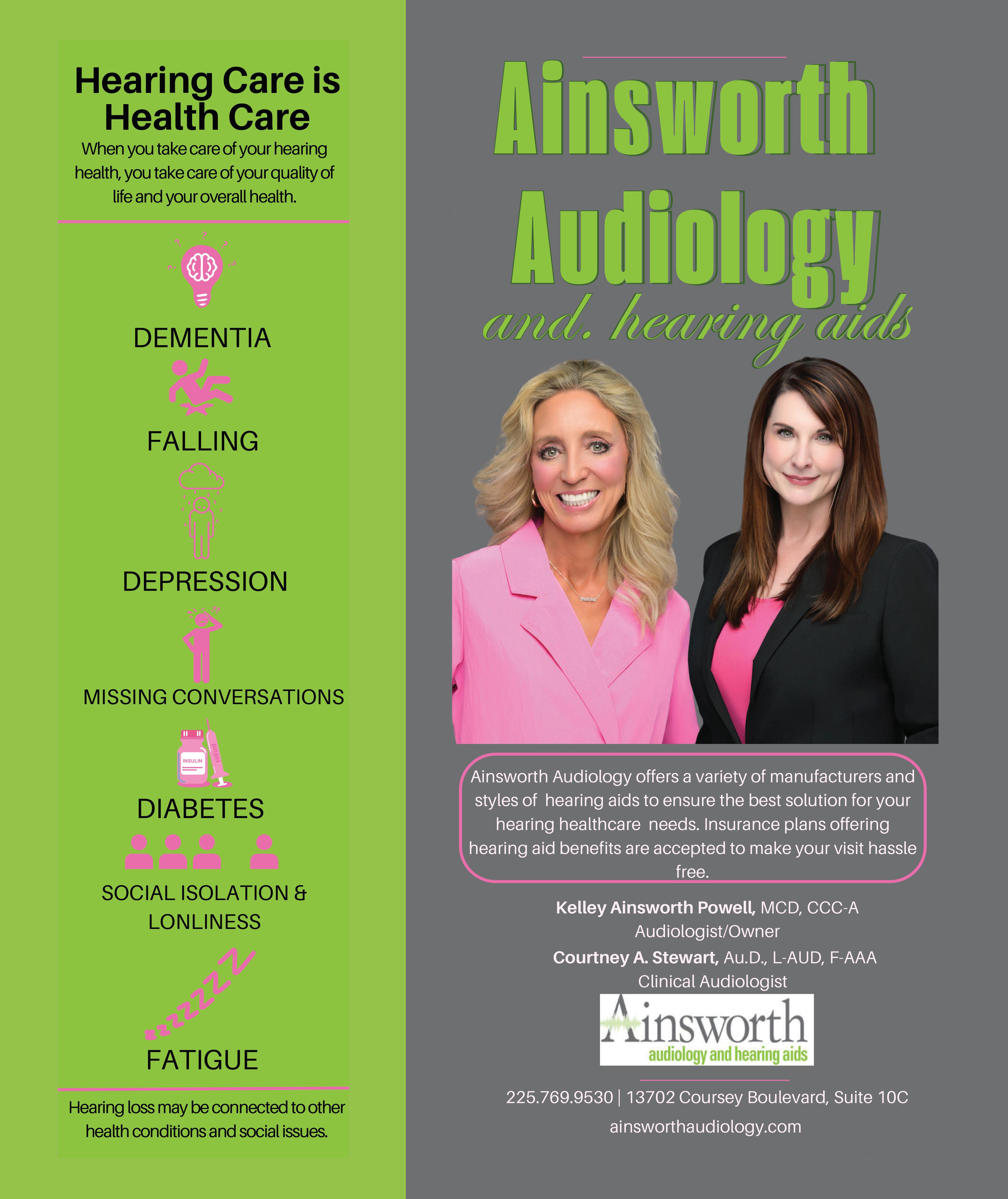
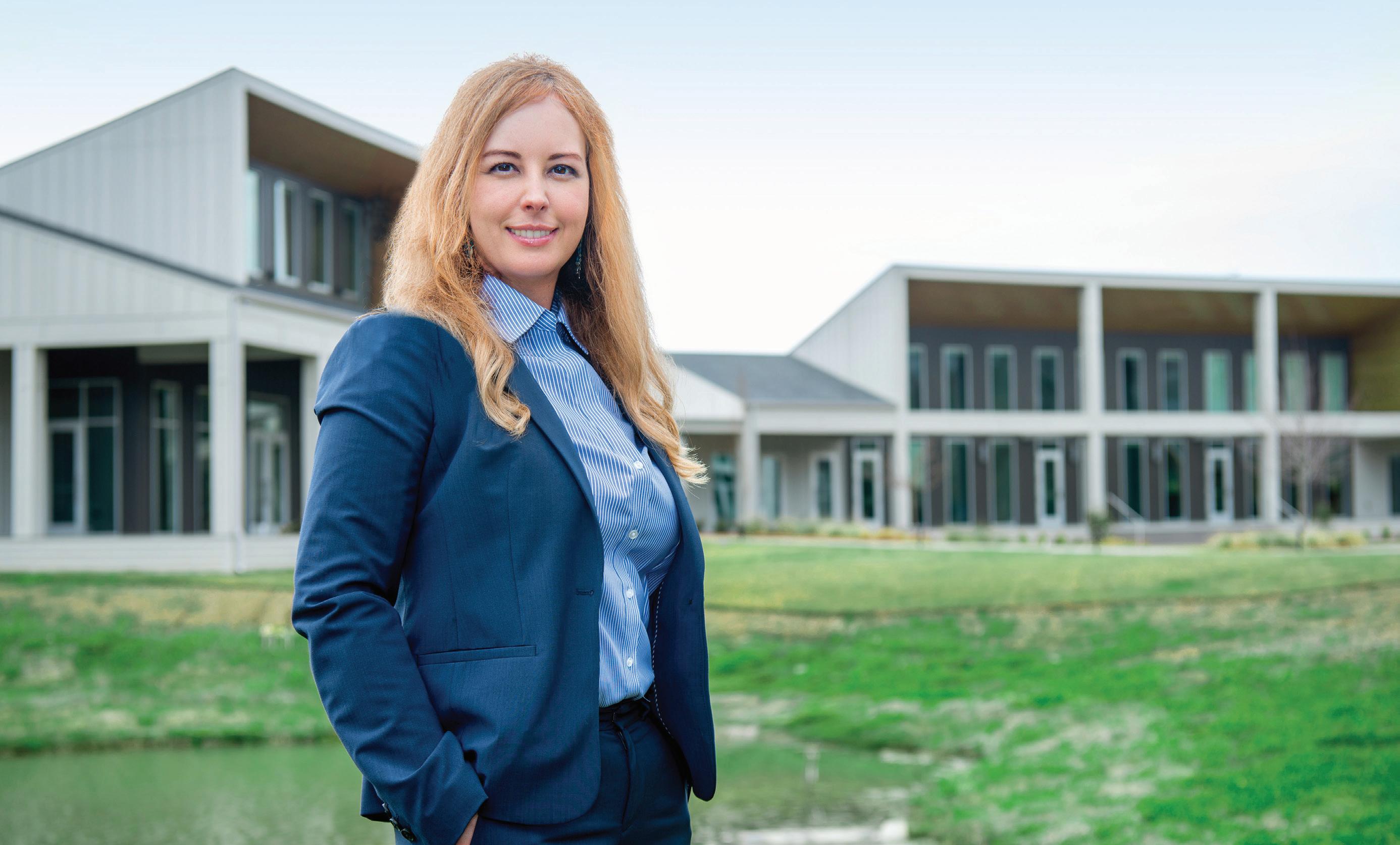

A roadmap for long-term life planning for yourself , your aginglovedones , and the nextgeneration
SPONSORED BY:





LOOK AT THE BIG PICTURE WHEN ASSESSING HOW MUCH HELP AN AGING LOVED ONE NEEDS
Caring for aging parents is a complex, emotional and often exhausting journey. Recognizing when a parent needs assistance can be challenging, as the signs are often subtle and easily explained away.
That’s why experts say the No. 1 priority of family caregivers and loved ones during this delicate stage of life can be summed up in three words: Connect the dots.
Various indicators, from declining physical health to changes in behavior, may not seem serious when taken individually. Taken together, they can suggest that an aging parent needs additional and, in some cases, specialized professional support.
Whatever the conclusion, the situation must be approached with sensitivity and a respect for their autonomy.
Brandon Ratcliff, president and founder of Homecare of Louisiana and a Certified Dementia Specialist, understands firsthand the challenges of caring for the elderly. He notes that many families find themselves in a situation where one spouse is caring for the other, and the caregiver’s health subsequently declines.
“They become more forgetful,” Ratcliff explains. “You might notice that mom isn’t quite taking care of her house the way she used to, she’s constantly calling you, and a lot of times it’s because they’re lonely.”
He emphasizes the significant impact of loneliness on seniors, citing a National Institute on Aging study that equates six to eight hours of daily solitude to smoking 15 cigarettes. The institute notes that people with hearing and vision loss are especially
“In hindsight people often recognize the subtle shifts and clues that were there,”
-Shelly Weaver, director of social work at The Hospice of Baton Rouge.
at risk of social isolation and loneliness and suggests things like taking a class, adopting a pet or using video chat or smart speakers to stay connected.
Other warning signs can include missed medications, spoiled food in the refrigerator, confusion about finances, frequent falls and a decreased interest in previously enjoyed activities. Ratcliff also points out that seniors may avoid bathing due to a fear of falling in the shower. They also may become hesitant to leave the house due to similar anxieties. These seemingly minor changes can be significant indicators that a parent is struggling.
The question of when to intervene is crucial. Ratcliff suggests that by the time family members recognize the signs, it’s often past time for intervention.
“Once you see the warning signs, you need to step in,” he advises, “because it could mean the difference between four to six hours of care a day versus 24 hours.”
EARLY INTERVENTION CAN SIGNIFICANTLY IMPROVE A PARENT’S QUALITY OF LIFE AND PREVENT FURTHER DECLINE.
Having the conversation about needing help can be difficult. If a parent is a danger to themselves or others, Ratcliff advises, “It’s time for the kids to become the parents.” Just as parents made difficult decisions for their children, adult children may need to make tough choices for their parents—even if those choices are met with resistance.
Ratcliff notes that while elderly individuals are often appreciative of care, they may be reluctant to accept it due to a fear of losing their independence or having a stranger in their home. Homecare of Louisiana prioritizes matching caregivers with clients based on personality, recognizing the importance of a strong and compatible relationship.
“We have some folks with Alzheimer’s and
dementia that are kicking and screaming in the conversation with me,” Ratcliff shares, “but a week later this caregiver is their best friend.”
Director of Social Work Shelly Weaver, who has worked with The Hospice of Baton Rouge for 17 years, emphasizes the importance of early intervention.
“In hindsight,” she says, “people often recognize the subtle shifts and clues that were there, such as frequent falls, forgetfulness, unopened bills, stacks of letters on the counter piling up.”
Weaver stresses the importance of balancing respect for a parent’s autonomy with the need to ensure their safety. She recommends being proactive and direct in conversations, offering specific support rather than simply asking if help is needed.
Suggestions include setting up automatic bill payments, arranging grocery deliveries and organizing a schedule of family and friends to check in regularly.
Weaver also advocates for having these conversations early and often, not waiting until a serious illness or crisis occurs.
“Once you see the warning signs, you need to step in. It could mean the difference between four to six hours of care a day versus 24 hours."
“Adult children can advocate more easily if they aren’t guessing what their parents want,” she says, citing the example of a friend whose father was diagnosed with dementia. Because they had discussed his preferences beforehand, they were able to choose a group home that was a good fit for him, allowing him to spend his final days in comfort surrounded by family.
Weaver’s experience in hospice has prompted her to plan for her own future, including choosing a burial plot, writing her obituary and creating a financial guide for her husband.
“It’s never too early,” she says.
Recognizing the signs that aging parents need assistance is a crucial step in ensuring their wellbeing. By understanding the various indicators, approaching the conversation with sensitivity and offering specific support, families can help their parents maintain their independence and quality of life while providing the necessary care and assistance they deserve.

- Brandon Ratcliff, president and founder, Homecare of Louisiana


As the population continues to age, more and more adults find themselves in the role of caregiver for their elderly parents. This can bring a unique set of challenges, from managing health concerns to ensuring their loved ones’ safety and well-being. Here are some of the most common geriatric health issues seen by physicians at The Baton Rouge Clinic, as well as steps caregivers can take to provide the best support.
“The biggest issues we see are falls, urinary tract infections and cognitive decline,” explains Dr. Victoria Fruge, a primary care physician at the clinic.
Falls can be a sign of an underlying condition, so a comprehensive evaluation is crucial. Medications can also contribute to balance issues and cognitive changes in the elderly.
To prevent falls, Dr. Fruge recommends installing grab bars in the bathroom, using a shower chair and ensuring elderly patients have proper assistive devices like walkers or canes. After a fall, physical therapy can help improve strength and stability to prevent future incidents.
Urinary tract infections (UTIs) are also common in the elderly, often presenting with vague symptoms like confusion or incontinence.
“It’s important to make sure they’re staying hydrated and going to the bathroom regularly, which can help reduce the risk,” says Dr. Fruge. She also advises monitoring


for signs of urinary retention, which can contribute to bacterial growth.
Cognitive changes, including memory loss and difficulty with daily tasks, are another concern.
“We encourage exercise, social engagement, and mentally stimulating activities to help delay the onset of dementia,” Dr. Fruge notes. Caregivers should also watch for issues with finances or medication management, as these can be early indicators of cognitive decline.
In addition to regular checkups, Dr. Fruge recommends that caregivers take advantage of local resources, such as the East Baton Rouge Council on Aging’s Meals on Wheels program.
“These can provide valuable support and help ensure your loved one’s needs are met,” she says.
Along with monitoring for common health issues, another critical first step is addressing advanced care planning. “No one thinks about
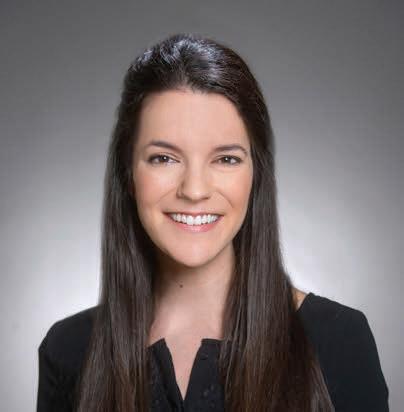
talking to their children or parents about what they would want done if something happened,” said Dr. Michael Rolfsen, an Internist at The Baton Rouge Clinic.
This can lead to family conflicts down the line if difficult decisions need to be made about end-of-life care. Dr. Rolfsen recommends having open conversations about living wills, advance directives and durable power of attorney.
“Unless you have a physician’s order, emergency responders are required to do everything possible to revive someone, even if that goes against their wishes,” he cautions. Documents like Louisiana’s Physician Order for Scope of Treatment (LaPOST) can ensure your loved one’s preferences are honored.
Another important consideration is longterm care planning. Long-term care insurance can cover in-home assistance, allowing elderly parents to age in place. However, these policies become more expensive as people get older, so it’s best to plan ahead. By addressing advanced care planning, long-term care options, and common health concerns, adult children can provide the best support for their aging parents. With the right preparations and resources, the transition to caregiving can be smoother for the whole family.
The Baton Rouge Clinic’s team of experts is here to guide you through every step. To make an appointment or for more information, visit online at batonrougeclinic. com or call 225.246.9240.

The East Baton Rouge Parish Library has made it a priority to ensure that seniors in our community have access to a wealth of engaging programs and resources to make their later years fulfilling. From lifelong learning opportunities to social activities and essential services, the library is committed to supporting the diverse needs of its senior patrons.
“We recognize that the golden years can sometimes bring challenges, but we’re here to provide the tools and experiences that can enrich this stage of life,” says Assistant Library Director Mary Stein.
One of the library’s key initiatives is its robust outreach to local retirement communities. The library’s bookmobile makes regular visits to more than 50 senior living facilities each month, bringing a curated selection of large print books, audiobooks and other materials directly to residents.
“The bookmobile is a lifeline for many of our seniors who may have difficulty getting to the library in person,” explains Stein. “We’ve equipped the vehicle with accessibility features like a wheelchair lift, so residents in wheelchairs or with mobility issues can easily access our resources.”
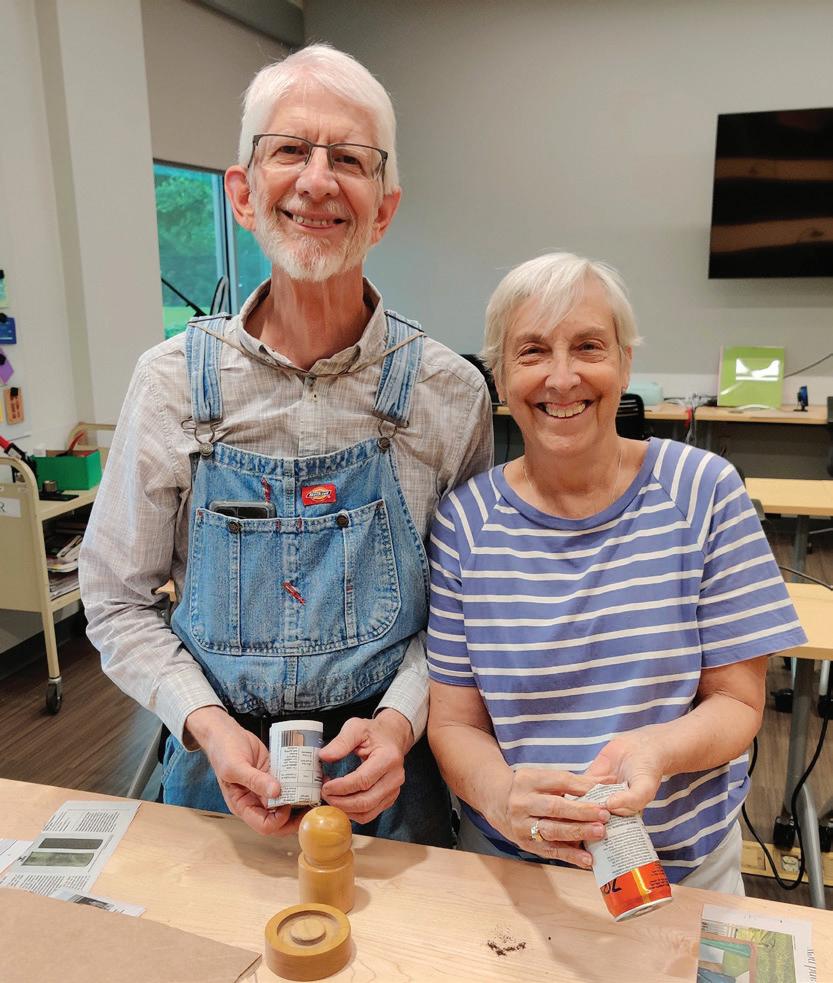
But the library’s commitment to seniors goes far beyond book delivery. The facilities themselves host a variety of programs and activities tailored to older adult interests and needs. This includes everything from technology workshops and genealogy research assistance to creative writing classes and mindfulness sessions.
The library also serves as a gathering place for senior-focused community groups, providing meeting space for various organizations.
“We understand that staying mentally and physically active is crucial for healthy aging,” Stein says. “That’s why we partner with organizations to offer programs that stimulate the mind, promote wellness and foster social connections.”
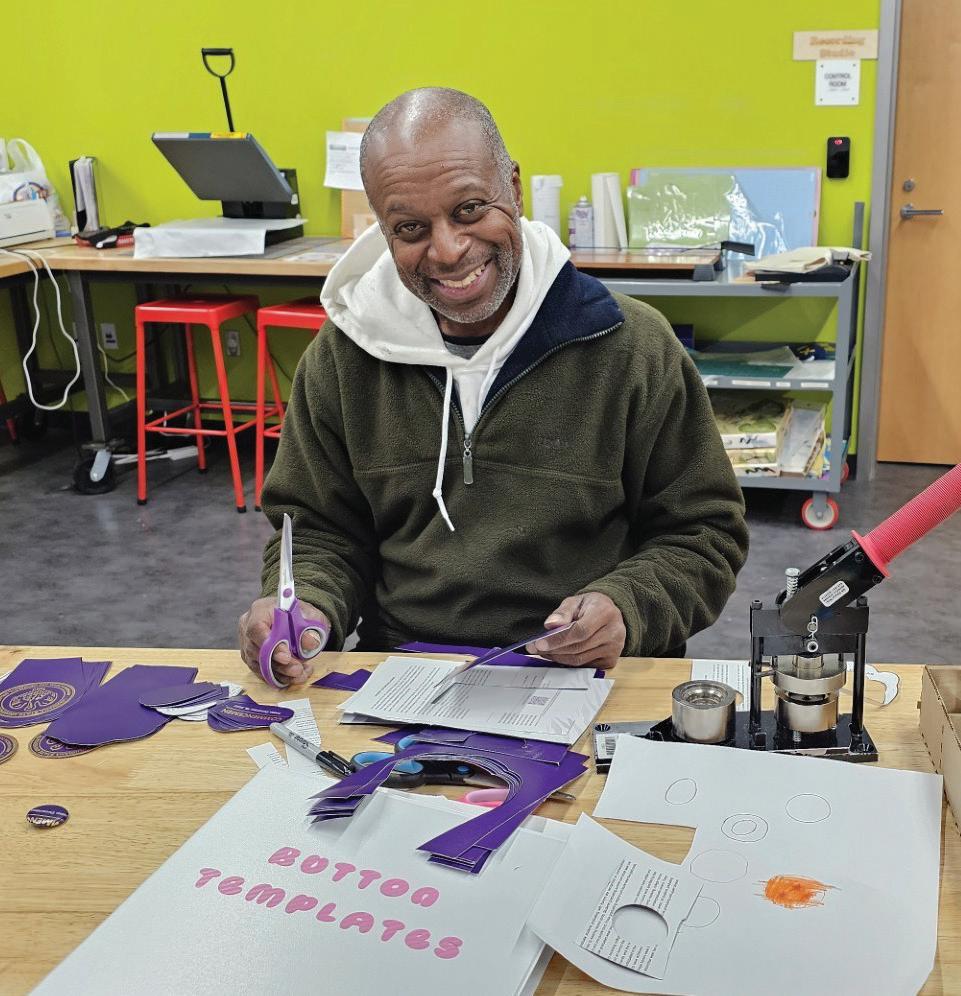
Beyond the physical space, the library’s digital resources also benefit seniors. With free access to e-books, audiobooks and online learning platforms like Brain HQ and Hiveclass, older adults can continue to expand their horizons from the comfort of home.
“Our patrons can access thousands of dollars’ worth of content and services simply by having a library card,” Stein says. “It’s a testament to the library’s commitment to lifelong learning and enrichment.”
As the East Baton Rouge Parish Library looks to the future, serving the needs of its senior community remains a top priority.
To learn more about upcoming events and resources, view the library’s written guide The Source, as well as the online events calendar ebrpl.com/events-classes.
HIVECLASS: ON-DEMAND COURSES INCLUDE AQUATICS, DANCE, MINDFULNESS, YOGA, PICKLEBALL, BRAIN EXERCISES AND MORE.
GALE PRESENTS UDEMY: ON-DEMAND COURSES INCLUDE NUTRITION, TENNIS, MEDITATION, DANCE, PIANO, PHOTOGRAPHY.
ARTISTWORKS: ON-DEMAND MUSIC LESSONS INCLUDING GUITAR, PIANO, SINGING, VIOLIN.
BRAINHQ: BRAIN EXERCISES FOR MEMORY, ATTENTION, DECISION MAKING AND NAVIGATION.
CREATIVEBUG: LIVE AND ON-DEMAND CRAFT COURSES INCLUDING PAINTING, CROCHET, COLORING MEDITATION, ORIGAMI.
CRAFTSY: LIVE AND ON-DEMAND
CRAFT COURSES INCLUDING EMBROIDERY, BAKING, GARDENING, JEWELRY MAKING.
Recent studies show that a quarter of millennials in the United States find themselves balancing caregiving roles for two generations: their baby boomer parents and their own Generation Alpha children.
As this scenario continues to unfold, it’s given rise to a new generational label, the “sandwich generation,” and members of this cohort are facing significant challenges. Their dual burden roles position them with intense time commitments, significant financial strain and personal savings and wellbeing sacrifices. Almost half of sandwich-generation adults reported that there was a time when their household was unable to meet essential expenses due to the costs of caregiving.
Louisiana millennials find themselves sandwiched as well. The state’s lagging support for medical care, lower median incomes, and the fact seniors are the fastest-growing demographic in the state exacerbate underlying issues. The state does offer a number of support programs, however, including:
• Aging and Disability Resource Centers: Streamlines access to long-term support services and facilitates for older adults, caregivers, persons with disabilities and parents of children with disabilities.
• The Family Caregiver Alliance (FCA): Offers residents access to CareNav, a free tool guiding caregivers on navigating time management, benefits and care coordination.
• Project SOAR: Louisiana Department of Health program empowers caregivers to share experiences and feedback, though this program currently focuses mainly on early-childhood healthcare.

Communities play an important role in support as well; faith-based groups, nonprofit caregiving support and local AARP chapters often offer advice, mutual support and connection. But experts say systemic support, not just individual coping strategies, is essential. Recommendations include:
• Financial planning: Tight budgeting, emergency funds and prioritizing emergency savings and paying down high-interest debt.
• Clarity: Honest conversations on financial status, estate planning, power of attorney and end-of-life wishes help clarify needs and boundaries.
• Support: Medicaid, respite care, caregiver training and support groups can help
offset emotional and logistical pressures. Medicare expansion to cover in-home care or federal long-term care insurance funded by payroll taxes have gained traction are also potential ways to ease caregiver burdens.
• Employer support: Urging employers to adjust their protocols to reflect the reality and pressures of modern caregiving.
With strong financial planning, open communication, use of support networks and shifting policies, caregivers can create more sustainable strategies for balancing responsibilities across generations—while preserving their own future.
According to the retirement services company Athene, NEARLY THREE QUARTERS OF AMERICAN MILLENNIALS have adjusted retirement goals to support their children and aging relatives, including:
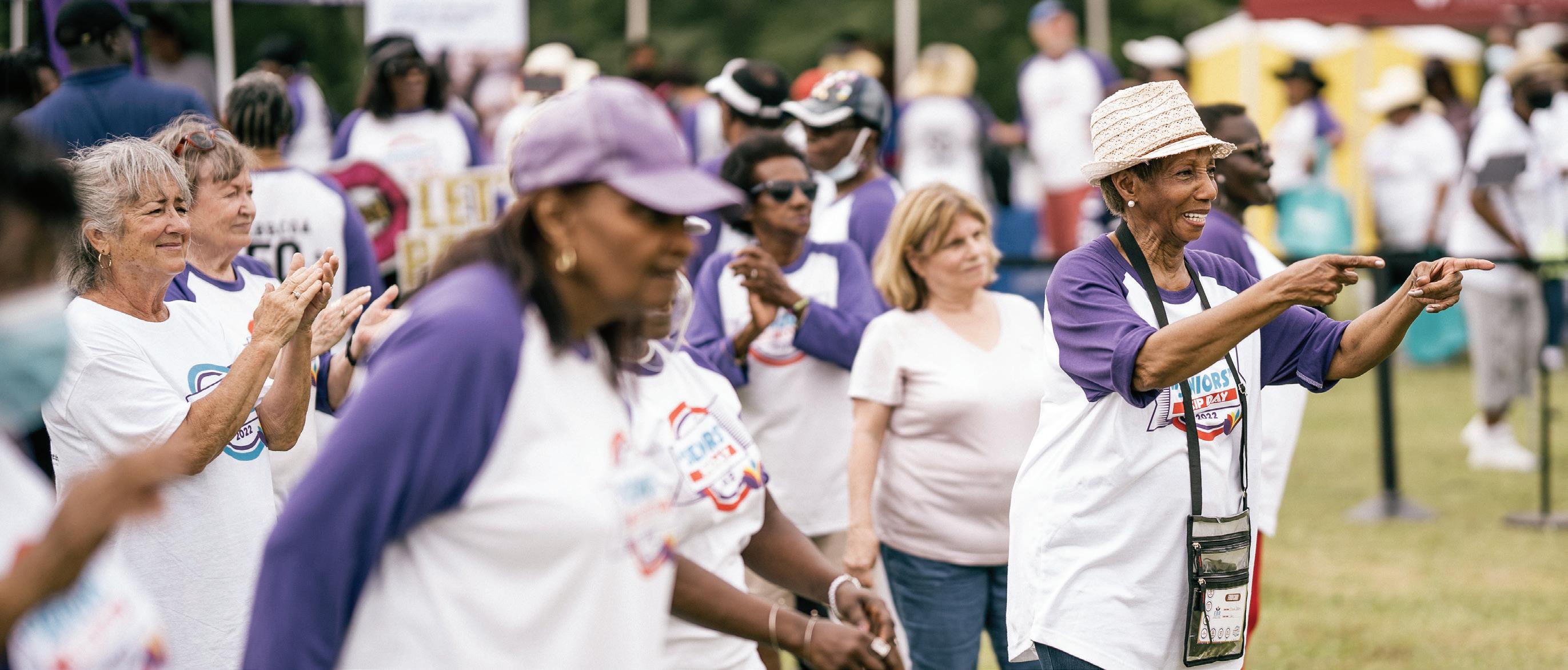


The East Baton Rouge Council on Aging (EBRCOA) has served the aging population of East Baton Rouge Parish since 1973 with a wide array of nutritional and social services. EBRCOA is charged with meeting and discovering the growing needs of our ever-increasing aged population.
Central to EBRCOA’s mission of service to seniors is the maintenance of personal independence and the enhancement of their storied lives.
16 SENIOR CENTERS IN EBR PARISH
1.5M TOTAL MEALS SERVED IN 2024
41,349 LOTUS BUS RIDES IN 2024
6,000 SENIORS VISIT CENTERS WEEKLY
4 NUTRITIONAL SITES IN EBR PARISH


The oldest trees often bear the sweetest fruit. – German Proverb
The East Baton Rouge Council on Aging (EBRCOA) recognizes the unique challenges faced by those caring for their aging parents. Many of you, while juggling demanding careers and busy lives, are now tasked with supporting aging parents and loved ones. Finding balance requires a pragmatic approach that respects the dignity of our elders and the realities of our own lives. EBRCOA provides accessible resources and practical support to ease the journey.
Parenting our parents is a role reversal that shifts long-established family dynamics. It requires patience, understanding, and a willingness to adapt. Just as they nurtured you as children, you now find yourself guiding them through a new phase of life that may include assisting with daily tasks, managing healthcare, supplementing finances, and ensuring their overall well-being. Your effectiveness in this new role requires an understanding of individual needs, a respect for independence, and a proactive ability to address the changing landscape of their lives.
EBRCOA is here to serve as a partner and your trusted expert in geriatric care management and caregiver support. We are present across the parish to support caregivers with wrap-around services suited for your senior loved ones. EBRCOA provides 25+ practical services and programs and utilizes a large database of referral sources for seniors and their caregivers. We are committed to empowering seniors to live life to the fullest! Our whole person approach to wellness focuses on the mind, body, and spirit, ensuring that our seniors receive comprehensive services and their caregivers receive the necessary support.
Here is a glimpse of what we offer:
• NEIGHBORHOOD SENIOR CENTERS
Group Activities: BINGO, Board games, puzzles, and friendly competitions foster a sense of camaraderie and belonging while supporting cognitive health.
• COMMUNITY ACTIVITIES & FIELD TRIPS
Community Outings: From museum visits to theater performances, we organize various educationalsocial activities to engage and entertain seniors.
• HEALTH AND WELLNESS
Fitness Programs: Tailored fitness programs, including yoga, aerobics, line dancing, and chair exercises to promote physical health and flexibility.
• FREE ACCESSIBLE TRANSPORTATION
Free Rides: Dependable transportation service to senior activities, doctor appointments, and grocery stores
• AGING-IN-PLACE HOUSING
Safe Affordable Senior Living: Two independent senior living communities that cater to fixedincome seniors
We're here to support you. Contact us. Our team is ready to discuss your specific needs and work with you to develop a comprehensive plan that ensures the well-being of your parents and your peace of mind.
Sincerely,
Tasha Clark-Amar Chief Executive Officer
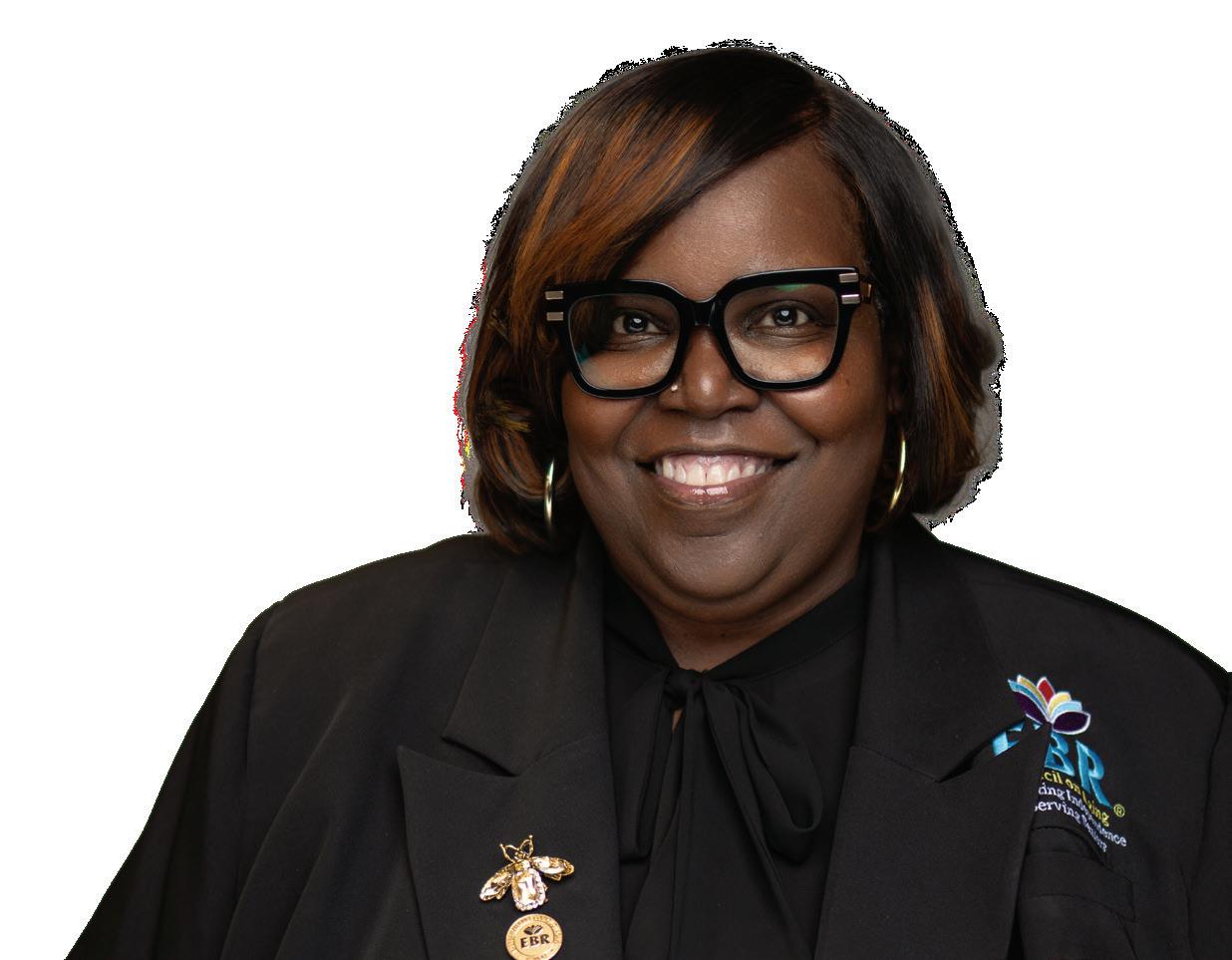
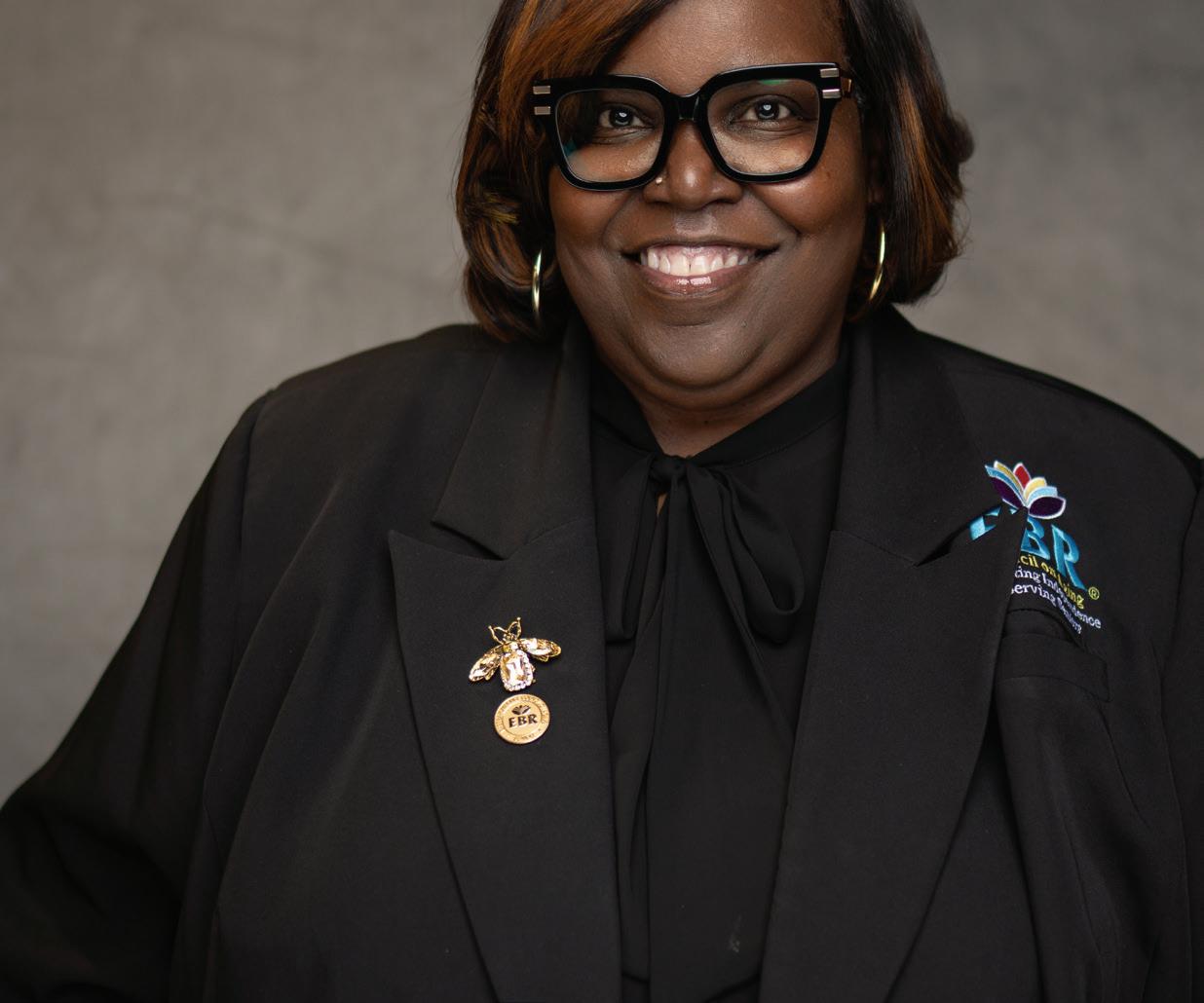


The Information Assistance & Management Department is staffed by trained care managers and social workers who answer questions, conduct thorough client need assessments, make appropriate service recommendations, and refer clients to appropriate EBRCOA services.
SERVICES INCLUDED:
• Case Management
• Comprehensive Assessments
• Medicare, Medicaid, MIPPA Assistance
• Material Aid (incontinent supplies, durable medical equipment, supplemental nutrition supplies, etc.)
• Utility Assistance (Power to Care)
Senior Fitness Program - EBRCOA offers fun and seniorfocused fitness classes and wellness programs to keep seniors active and healthy. Some examples include warm-up aerobics, balance, strength training, stretching, Tai Chi, water aerobics, line dancing and yoga.
These activities along with arts and crafts and numerous other activities offer a stimulating, social, healthy, proactive lifestyle option for our seniors.

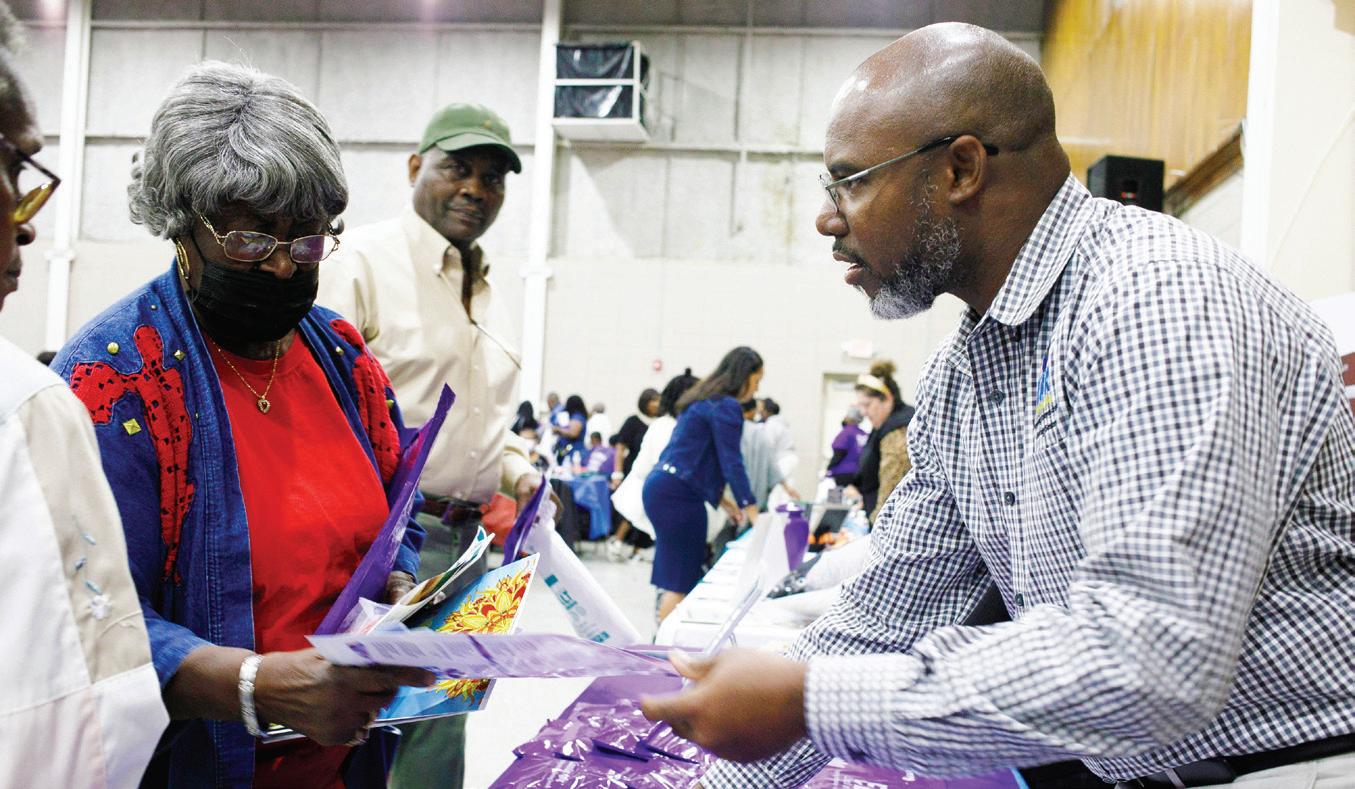
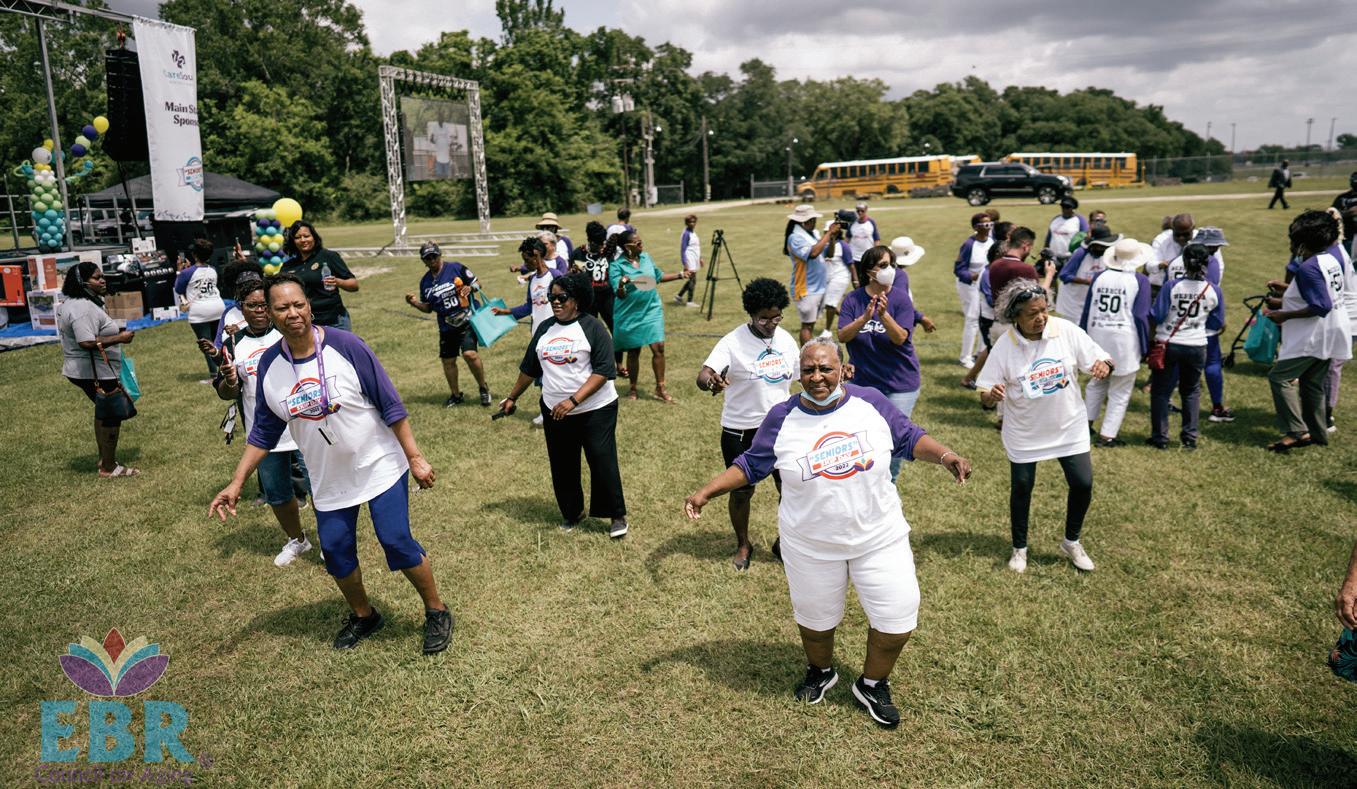

LOTUS RIDES - EBRCOA’s Lotus Rides Transportation Department provides transportation services to seniors to and from the EBRCOA senior centers, agency events, doctor appointments, and grocery stores across the parish.







EBRCOA has 16 Senior Activity Centers and 4 Nutritional Sites that provide services and activities for seniors 60 and above. Our centers offer various services, including recreational activities, educational classes, health and wellness programs, meals, trips, and transportation. The goal is to promote healthy aging and to provide seniors with a place to socialize, stay active, and maintain independence.
AGING-IN-PLACE HOME MODIFICATIONS
EBRCOA assists seniors with home modifications to help maintain independence and prevent accidents. Modifications range from replacing doorknobs with pull handles, to major projects. These modifications can greatly improve the accessibility and adaptability of a home.
HOUSING ASSISTANCE
EBRCOA offers safe affordable housing options with aging-in-place features.
• THE DUMAS HOUSE

An independent living community that caters to low-income seniors aged 62 and above.
• THE LOTUS VILLAGE SENIOR LIVING COMMUNITY
An independent living community featuring 116 mixed units equipped with a washer/dryer, walkin shower, and NEST thermostat. Designated as the very first senior village in Louisiana by the Village to Village Network (VTVN).
EBRCOA is designated by the State of Louisiana to operate as the disaster preparedness arm for seniors during emergency situations. Our role is to protect the lives of seniors during any emergency including, but not limited to, pandemics, floods, hurricanes, and food deficits.
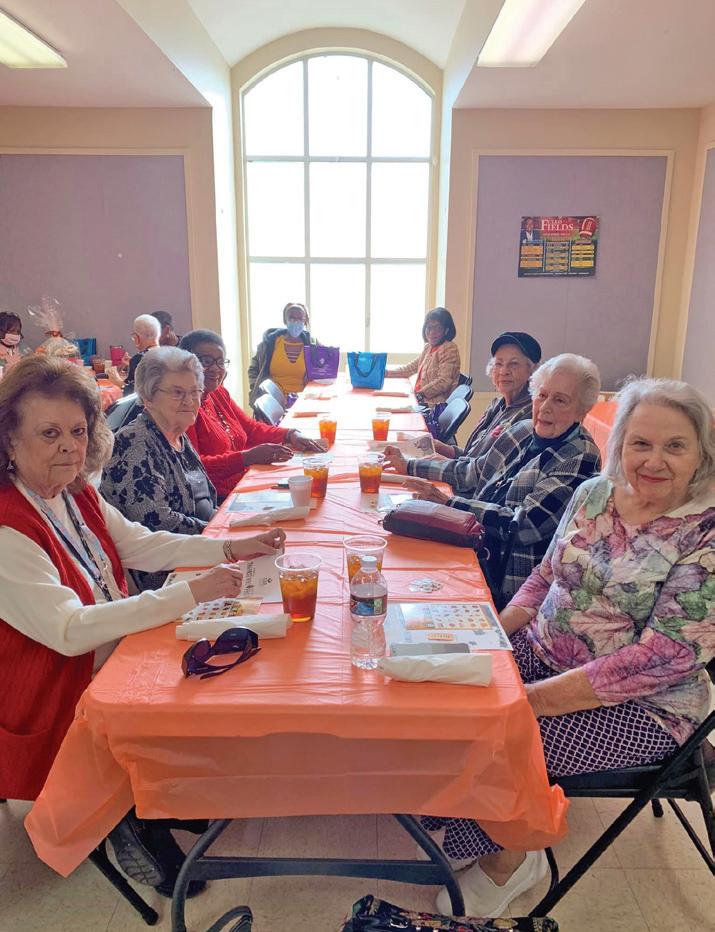

CONGREGATE (HOT) MEAL PROGRAM
Hot meals are served 5 days a week during lunch hours in a group setting at our senior activity centers and nutritional sites across the parish. We also provide hot meals for holidays and special dinners. Chef Celeste Gill, Nutritional Director, incorporates delicious menu items that create variety for our seniors to enjoy. The meals are healthy and designed to meet the nutritional needs of adults 60 and over.
MEALS ON WHEELS (HOME DELIVERED MEALS)
Meals on Wheels is designed specifically to meet the nutritional needs of homebound seniors. Each meal meets the dietary guidelines set by The Older Americans Act Nutrition Program and includes detailed food nutritional analysis such as amount of sodium, fiber, protein, fat, vitamins, and calories. The Meals on Wheels weekly box includes:
THE MEALS ON WHEELS BOX INCLUDES:
• 7 Homecooked Meals (Frozen)
• Half-gallon of Milk
• Bread
• Fruit
• Snacks
LOTUS FOOD PANTRY

EBRCOA, in collaboration with The Greater Baton Rouge Food Bank and USDA, offers seniors aged 60 and older the opportunity to shop in our supermarket-structured food pantry for essential items such as fresh fruit, produce, baked goods, canned goods, toiletries, personal/hygiene items, incontinent supplies, and household items.
The program provides short term assistance to seniors aged 60 and older to assist with paying their Entergy, DEMCO, water bill, and/or rental assistance.
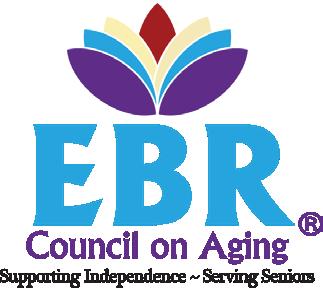
IF YOU ARE INTERESTED IN ANY OF THE EBRCOA SERVICES, CONTACT US AT (225) 923-8000
SCAN QR CODE TO COMPLETE SERVICE APPLICATION



DON’T MISS THE CHANCE TO EXPLORE YOUR FAMILY HISTORY BEFORE PARENTS AND GRANDPARENTS PASS
As our parents age, the family dynamic begins a profound shift. We begin to recognize the importance of the stories – told and untold – about the life experiences they’ve had and the wisdom they’ve gained as a result.
Those life experiences are the foundation of our extended family identities. Capturing and preserving these precious legacies through meaningful conversations and creative documentation is more than a reminiscence. It preserves history for future generations, and brings adult children and their elders closer together at the precise
moment they need each other most.
Jen Cramer, director of the T. Harry Williams Center for Oral History at Louisiana State University, was first learning about oral history as a student when her teacher said something she never forgot: “Every time an elder dies, a library burns down.”
Conducting an oral history with a parent or grandparent is a great way to connect with a loved one and deepen the roots of our past. The Williams Center staff can offer guidance on how to conduct interviews, how to turn your phone into a broadcast quality recorder and how to make sure that your interview is
“Every time an elder dies, a library burns down.”
-Jen Cramer, director, T. Harry Williams Center for Oral History at Louisiana State University
secured for future generations.
Legacy conversations provide context for who we are and can offer comfort in times of hardship, guidance in moments of uncertainty and a powerful sense of belonging.
The benefits of engaging in legacy conversations are far-reaching. For aging parents, it can be a chance to reflect on their life and share their wisdom and experiences with those they love. For children, it can strengthen family bonds, foster empathy and provide a sense of continuity. They might offer a chance to ask questions you’ve always wanted to ask and to understand your
parents on a deeper level.
For future generations, these preserved stories and histories will serve as a powerful connection to their ancestors, shaping their understanding of themselves and their place in the world.
Cramer suggests asking open-ended questions and giving the person telling their story space by listening. Follow-up questions are a good way to keep the conversation flowing and taking photos is never a bad idea.
Finally, you can consider partnering with an organization like the Williams Center (learn more at lib.lsu.edu/oralhistory) or the Library of Congress Veterans History Project (learn more below) that can preserve your interview.
Videoing the interview can help capture not just the stories themselves, but also the nuances of expression, the tone of voice and the personality of the storyteller. These recordings can then be passed down to family members.
Writing memoirs, either individually or collaboratively, organizing family photos or

creating memory books are other powerful ways to preserve family history.
In June, the East Baton Rouge Parish Library launched “Summer of Legacy ” for those interested in creating a Legacy Letter to be shared with loved ones. Free workshops will continue every Monday in August during which participants take part in a live, online session with Legacy Letter founder Blake Brewer. Register at EBRPL. com/digital-library/summer-of-legacy.
Participants craft a heartfelt Legacy Letter—a personal message to children, grandchildren, or loved ones that conveys care, certainty, affection, apologies, family history and values, memories and more.
For families who may have a member showing signs of Alzheimer’s or dementia, Legacy Letters can be a tool for preservation and renewal.
“We think it has the potential to be a transformative experience for the entire community,” stated Brandon Reilly, adult programming coordinator.
Once the live sessions are over, a selfpaced Legacy Letter module will continue to be available at EBRPL.com/digital-library.
If your aging loved one is a U.S. military veteran, consider recording an oral history and donating it to the Library of Congress Veterans History Project.
LEARN HOW AT LOC.gov/programs/veterans-history-project.
The library also continues to schedule regular programs and workshops related to capturing oral history, scanning and organizing important family papers and documents and digitizing home movies.
Beyond the Legacy Letter program, other valuable resources exist to aid in preserving family stories. StoryCorps, since 2003, has been building the largest collection of human voices ever archived. It offers selfdirected recording tools and recording sites, encouraging individuals to have meaningful conversations and preserve their voices for future generations.
Sites like StoryKeeper and Storyworth help you record family stories in a keepsake book, while MyHeritage allows you to create a family tree, search records about your ancestors and even test your DNA.
The legacy we leave behind is not just material possessions, but also the memories that mold us. By engaging in legacy conversations and preserving their revelations, we are not only honoring our parents and ancestors, we are gifting future generations a better understanding of themselves.


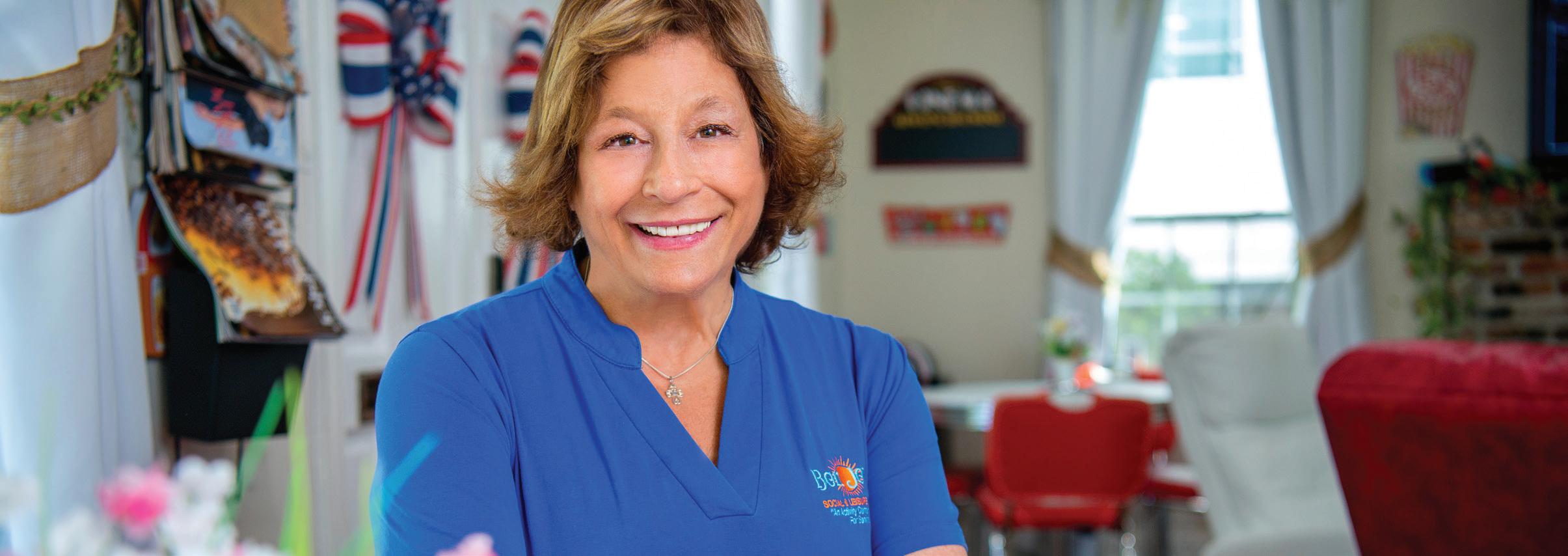

Louisiana’s first Certified Fit Minds Cognitive Coach and Trainer Maria Yiannopoulos believes it’s better for families to get information on difficult subjects like dementia care early on than while they’re also dealing with the emotional effects of late-stage diseases. Committed to innovation in cognitive wellness, the Certified Dementia Practitioner® saw a need for seniors to have social connection, companionship, and intellectual stimulation while serving as marketing director for an assisted living facility.
“When COVID hit, the demise among the senior population was exacerbated due to lack of social connection,” Yiannopoulos said. “Depression set in with formerly vibrant people because they were isolated. I truly believe that many people perished due in large part to loneliness.”
When Yiannopoulos became the executive director of the facility post-pandemic, families began asking if they could bring their loved ones to visit for the social interaction.
“Unfortunately, we could not do that due to state regulations,” says Yiannopoulos. “But the idea for Bon Jour Social was born.”
Since it opened in 2023, Bon Jour Social and Leisure Center, a cognitive wellness club for aging seniors with mild cognitive dementia, has emerged as a vital resource for families seeking meaningful engagement for elderly loved ones. The traditional “bonjour” is split into two words so elderly readers can more easily discern its meaning: “good day.”
While Bon Jour Social is a place for seniors with dementia to socialize from Monday through Thursday, it is also thoughtfully structured to benefit their wellbeing. Starting the day with chair yoga and meditation, Bon Jour Social offers Fit Minds small group classes from 11:30 a.m. to 12:30 p.m.
As Yiannopoulos learned when pursuing the Fit Minds certification, seniors with mild cognitive dementia receive the biggest impact from the program between 9 a.m. and noon, because the brain is most alert during morning hours.
“Caregivers tell us they see significant differences in family members. Some who couldn’t even hold a pencil can now write their names, have discussions, and participate in activities,” Yiannopoulos said.
Bon Jour Social’s structured afternoons include physical activities, which Yiannopoulos has learned are important at the end of the day.
“Things like balloon volleyball allow dementia patients to expend energy without as heavy of a mental focus,” she explains. “Our clients may not be able to see that very well because of declining eyesight, so what looks like a game may require them to focus more than it would someone who is traditionally healthy. These activities allow them to get out some energy and have fun while also benefiting them.
“Because there is not a cure for dementia today, these resources will not help the disease go away, but caregivers can rest assured that they are participating in resources that can help slow it down.”
Yiannopoulos emphasizes that one of the most important elements of Bon Jour Social, whose classes are $100 per day including lunch, snacks and all activities, is the benefits it offers to caregivers.
“Most people are comfortable at home, but that’s actually the worst thing we can do for ourselves as we age—particularly with dementia. Being at home alone gives dementia the opportunity to intensify and affect the lobes faster,” says Yiannopoulos. “Bon Jour gives patients a chance to get out of the house and be with peers without judgment, but it also gives caregivers a much-needed break.”
In addition to Bon Jour Social, Yiannopoulos also offers Dedicated Sitters, a senior sitter service where sitters go to patients’ homes, run errands, and take loved ones to doctors’ appointments.
“We are finding that Bon Jour Social and Dedicated Sitters’ resources are helpful for caregivers who are local but also for adult children who live out of state,” says Yiannopoulos.
Eligible families in Louisiana whose loved ones are on Medicare and have dementia diagnoses are now able to get payment from Medicare to use for Bon Jour and Dedicated Sitters’ services under the Guide Model Program.
“No one should have the burden of worrying about a family member with dementia,” Yiannopoulos says. “But until there is a cure, I’m grateful to be able to help alleviate the stress of caregiving and increase the quality of life for loved ones.”
Amedisys Hospice
3854 American Way, Suite C, Baton Rouge 70816
225-751-4599 | locations.amedisys.com/la/ baton-rouge/hospice-1280
Amedisys Home Health Care
3854 American Way, Suite D, Baton Rouge 70816 225-751-8201 | locations.amedisys.com/la/ baton-rouge/home-health-1251
Ascension Oaks Nursing & Rehabilitation Center 711 W. Corner view Road, Gonzales 70737 225-644-6581 | ascensionoaksnursingandrehab.com
Audubon Home Health & Hospice
9256 Interline Ave., Baton Rouge 70809 225-218-8009 | audubonhomehealth.com
Azalea Estates of Gonzales 2305 S. Purpera Ave. , Gonzales 70737 225-644-1028 | ssmgrp.com
Barclay House of Baton Rouge 9394 Siegen Lane, Baton Rouge 70810 225-361-2221 | qslmseniorliving.com/senior-living/ la/baton-rouge/siegen-ln
Bridgeway Healthcare & Hospice 4333 American Way, Baton Rouge 70816 225-753-1495 | bridgewayhospice.net
Capitol House Nursing & Rehabilitation Center 11546 Florida Blvd., Baton Rouge 70815 225-275-0474 | capitolhouseofbr.com
Chateau D'Ville Rehab and Retirement 401 Vatican Drive, Donaldsonville 70346 225-473-8614 | chateaudville.com
The Claiborne at Baton Rouge (1) 9511 Creek view Drive, Baton Rouge 70836 225-424-6714 | theclaiborne.com
Elara Caring 4860 Bluebonnet Blvd. , Baton Rouge 70809 225-928-1666 | elara.com/locations/baton-rouge-la
Fidelis Residential Care Homes
dba Fidelis Care Group 6543 E. Achord Road, Baton Rouge 70817 225-399-3117 | fideliscaregroup.com
Fidelis White Road House
dba White Road Serenity Home 10359 White Road, Denham Springs 70726 225-271-4663 | fideliscaregroup.com
Francois Bend Senior Living 326 East Industr y St., Gonzales 70737 225-647-2363 | francoisbend.com
Garden View Assisted Living of Baton Rouge 3130 Jones Creek Road, Baton Rouge 70816 225-706-0037 | gardenviewbr.com
Gonzales Healthcare Center 905 W. Corner view Road, Gonzales 70737 225-644-5358 | nexion-health.com/gonzales-healthcare
D B A-doing business as
Published Aug. 5,
The Guest House Care Center
10145 Florida Blvd., Baton Rouge 70815
225-272-0111 | theguesthousebr.com
Heart of Hospice
10528 Kentshire Ave., Suite 100, Baton Rouge 70810
225-412-2614 | lhcgroup.com/locations/ hear t-of-hospice-baton-rouge
Heritage Manor of Baton Rouge 9301 Oxford Place Drive, Baton Rouge 70809 225-924-2851 | heritagemanorofbatonrouge.com
Holly Court Assisted Living and Memory Care 8585 Summa Ave., Baton Rouge 70809 225-767-7877 | hollycour tal.com
Home Instead
5055 S. Sher wood Forest Blvd., Baton Rouge 70816 225-424-7855 | homeinstead.com/home-care/usa/la/ baton-rouge/328/ser vice-area
Hospice Compassus of Baton Rouge 6700 Jefferson Highway, Building 1, Baton Rouge 70806 225-320-2357 | compassus.com/locations/louisiana/ baton-rouge
Hospice in His Care LLC 4301 Bluebonnet Blvd., Suite B, Baton Rouge 70809 225-214-0010 | hospiceinhiscare.com
The Hospice of Baton Rouge 3600 Florida Blvd. , Baton Rouge 70806 225-767-4673 | hospicebr.org
House of Grace
32956 Louisiana 16, Denham Springs 70706 225-271-4445 | thehouseofgrace.com
Jefferson Manor Nursing & Rehabilitation Center 9919 Jefferson Highway, Baton Rouge 70809 225-293-1434 | jeffersonmanornursingandrehab.com
La Plantation Retirement Community 26635 La. 16, Denham Springs 70726 225-667-1484 | laplantationds.com
Lake Sherwood Village 4101 Plaza Tower Drive, Baton Rouge 70816 225-296-0803 | lakesher woodvillage.com
Landmark of Plaquemine
59355 River West Drive, Plaquemine 70764 225-385-4332 | landmarkofplaquemine.com
Legacy Nursing and Rehabilitation of Port Allen
403 Nor th 15th St, Por t Allen 70767 (225) 346-8815 | legacy-nursing.com/por t-allen-la
Life Source Hospice
11605 Southfork Ave., Suite A, Baton Rouge 70816
225-291-9421 | lifesourcehospice.net
The Lodge At Lane
6170 Carpenter Road, Zachar y 70791
225-658-4345 | thelodgeatlane.com
Baton Rouge Iber ville,
Feliciana
compassionate in-home care, including help with daily tasks, shor t-term respite relief and hospice
East Baton Rouge East Feliciana, Iber ville, Livingston Pointe Coupee, St. Helena West Baton Rouge, West Feliciana Offers hospice and palliative care ser vices in private homes, assisted living and nursing environments for a multi-parish ser vice area
Family-owned and operated in-home hospice ser
Feliciana
Coupee St. Helena, West Baton Rouge West Feliciana Non-profit organization providing inpatient and at-home comprehensive end-of-life and palliative care

As Americans continue to live longer, the challenges of caring for aging parents are becoming increasingly common. Adult children often find themselves navigating a complex web of financial, legal and medical decisions – all while trying to balance their own careers and family responsibilities.
The team at Peters Wealth Advisors understands these challenges firsthand. As a boutique financial advisory firm, they take a personalized, holistic approach to estate planning and elder care planning. By talking through several money topics as your parents age, you could help bring peace of mind to both you and your parents.
“One of the key things we emphasize is involving adult children early on in the estate planning process,” explains Dustin Dowling, managing partner of Peters Wealth Advisors. The goal is to equip both our clients and their children with a collaborative plan designed to ease the burden of emotional, albeit inevitable decisions.
First, approach these discussions gradually and be mindful of your parents’ comfort levels. Start by meeting them where they are emotionally, which can set the stage for more open and honest dialogue.
Next, it’s crucial to consider whether you’ll need to support your parents financially as they grow older. Encourage them to share their financial situation with you, which will give insight into whether they’re financially secure or they’ll need your help. If additional support is needed, having this information early allows you to plan and save accordingly.
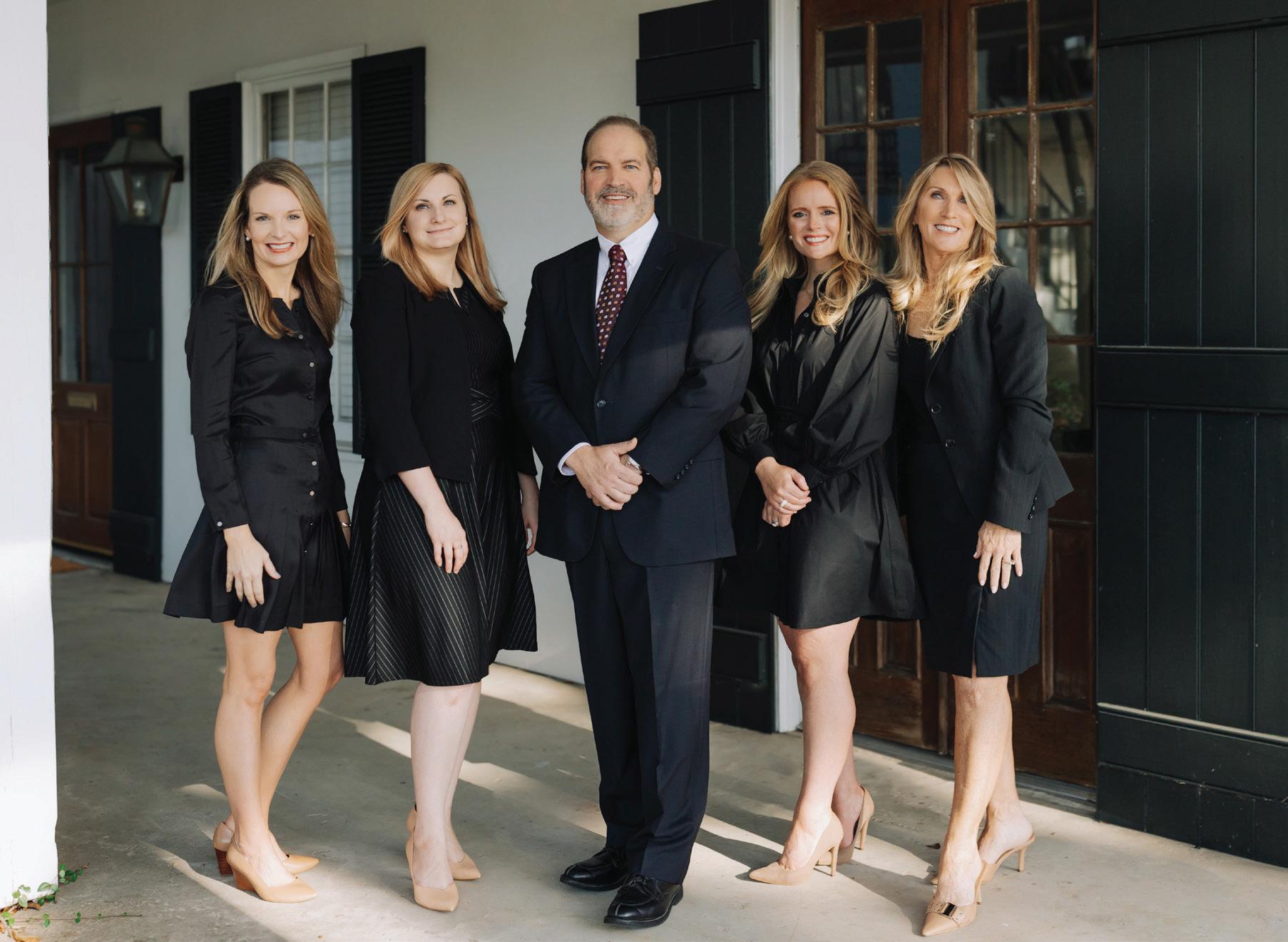
Third, consider setting up a revocable living trust. This legal tool allows your parents to designate a trustee to manage their assets if they are no longer able to do so. In some instances, a trust can be set up with a “trust protector” - an independent third party who can oversee the trustee and ensure the parent’s wishes are carried out.
“Having that additional layer of oversight can give children peace of mind, knowing there’s someone watching out for their parent’s best interests,” says Dowling.
Another important step is discussing the need for a power of attorney. This document allows a trusted person to manage specific financial tasks, such as bill payments and property management, on behalf of your parents.
Finally, an advance directive, or living will, is a vital document that outlines your parents’ preferences for medical treatment and end-of-life care. It’s also worth talking about a healthcare proxy, or medical power
of attorney, which grants a trusted party the authority to make medical decisions on their behalf if they’re unable to do so themselves. In addition, a signed HIPPA authorization will allow you to communicate with your parents’ doctors regarding their health.
The advisors at Peters Wealth are ready to help you navigate the emotional and logistical challenges of caring for aging loved ones. “Our goal is to be a true partner throughout this process,” Dowling says. “We know it’s not easy, but we’re here to provide the expertise and support families need to care for their parents while also protecting their own financial futures.”
To learn more about Peters Wealth Advisors’ estate planning and elder care services, visit peterswealth.com or scan the QR code.
ADDRESS
WEBSITE
Louisiana War Veterans' Home 4739 La. 10, Jackson70748 225-634-5265| vetaffairs.la.gov/homes/ louisiana-veterans-home
Oakwood Village Assisted Living Community 4400 McHugh Road, Zachary70791 (225) 658-8888| vivaseniorliving.com/oakwood-village
Ollie Steele Burden Manor 4250 Essen Lane, Baton Rouge70809 225-926-0091| ololrmc.com
Our House for Respite 2967 Carmen Drive, Baton Rouge70809 225-776-0135| ourhouseforrespite.com
The Parc Senior Living (1) 1604 S. Burnside Ave., Gonzales70737 225-647-8400| theparcseniorliving.com
The Pearl at Jamestown 14443 Perkins Road, Baton Rouge70810 225-267-9714| phoenixsrliving.com/communities/ the-pearl-at-jamestown
DBA-doing business asNA-not applicableThe Business Report presumes the provided information is accurate based on publicly available information and 2024 submitted
Published Aug. 5, 2025.
1
Previously listed as Magnolia Assisted Living and Francois Parc
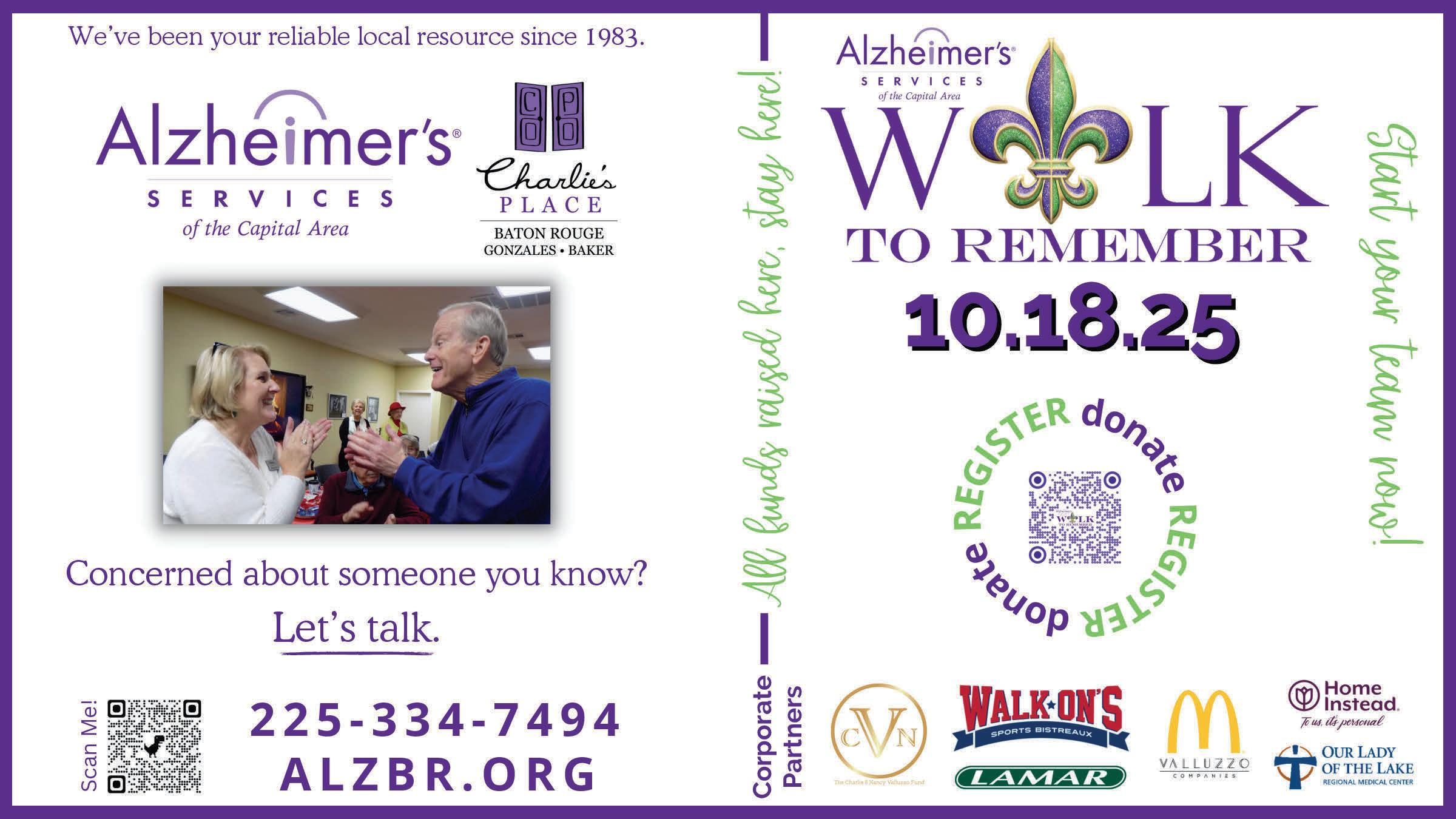
Pointe Coupee Healthcare
1820 False River Drive, New Roads 70760
225-638-4431 | pointecoupeehealthcare.com
Pointe Coupee Homebound Health and Hospice
350 Hospital Road, New Roads 70760
225-638-5717 | pchhh.org
River Oaks Nursing and Rehabilitation Center
3612 Baker Blvd., Baker 70714
225-778-0573 | riveroaksnursingandrehab.com
Southside Gardens Retirement and Assisted Living Center
4604 Perkins Road, Baton Rouge 70808 225-922-9923 | southsidegardens.com
St. Clare Manor Nursing and Rehabilitation 7435 Bishop Ott Drive, Baton Rouge 70806 225-216-3604 | stclaremanor.com
St. Helena Parish Nursing Home 32 N. Second St., Greensburg 70441 225-222-4102 | sthph.com/about-3
D B A-doing business as N A-not applicable The Business Report presumes the provided information is accurate based on publicly available information and 2024 submitted data. Published Aug. 5, 2025.
All rankings are determined solely through independent research. Highlighted entries are for those companies that pay a fee for an upgraded listing after their eligibility for the list has been determined.
by Emma

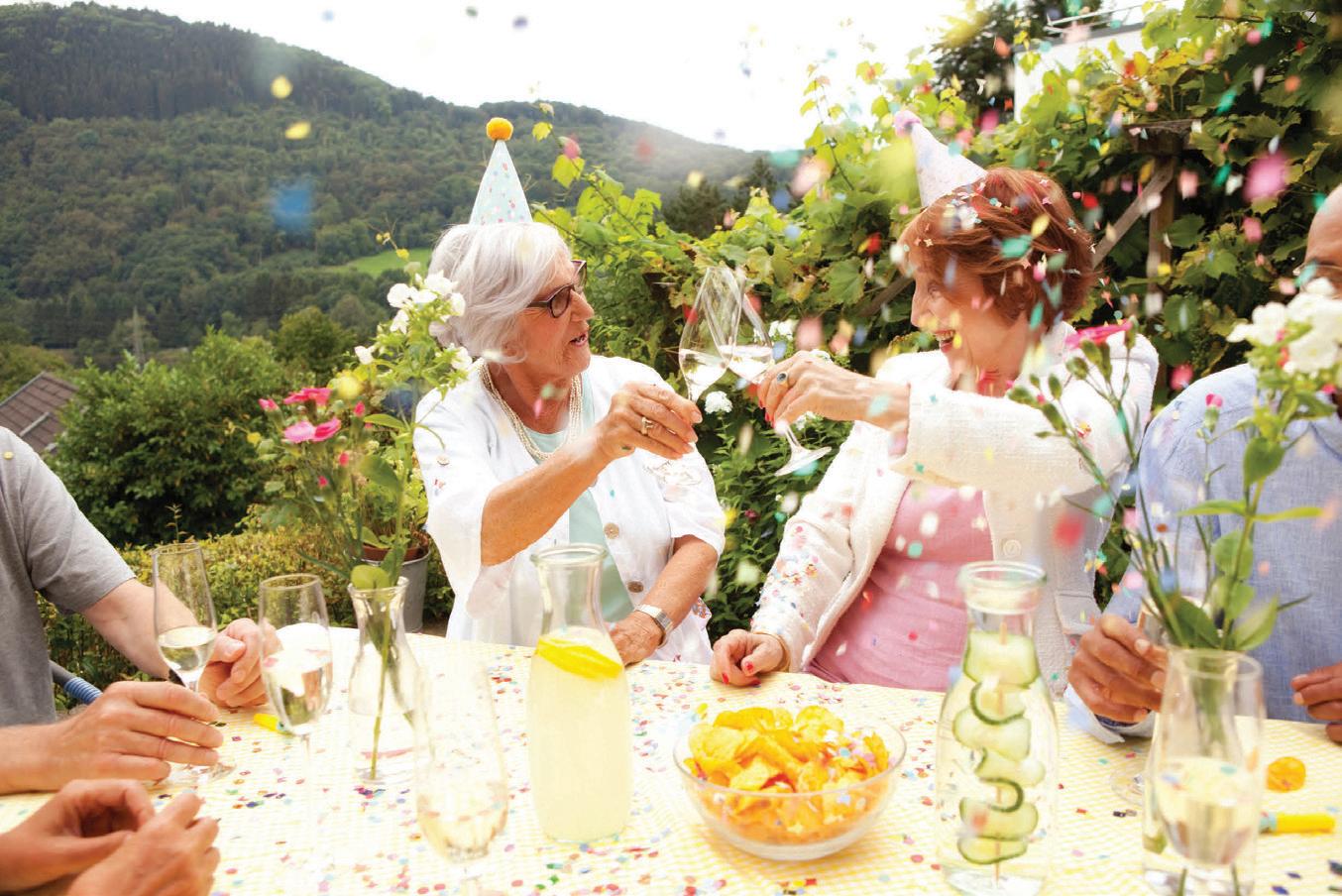


We believe aging is a journey to be celebrated—a time for comfort, dignity, and the joy of living life on your terms. Our premier non-medical home care services provide personalized support with elegance, ensuring you or your loved one continue to enjoy the lifestyle you cherish.
With compassionate caregivers and a commitment to excellence, we offer assistance with daily routines, personal care, companionship, and the little touches that make life special. Because every stage of life deserves to be lived beautifully.
At Home Care of Louisiana – Honoring Your Journey, Elevating Your Care. Contact us today to experience care designed for a life well-lived.

St. James Place of Baton Rouge 333 Lee Drive, Baton Rouge70808 225-215-4500| stjamesplace.org
Sterling Place Healthcare and Rehabilitation Center 3888 North Blvd., Baton Rouge70806 225-344-3551| sterlingplacebr.com
Sunrise at Siegen 9351 Siegen Lane, Baton Rouge70810 225-765-7538| sunrisesiegen.com
Sunrise of Baton Rouge 8502 Jefferson Highway, Baton Rouge70809 225-877-1257| sunrisebatonrouge.com
Williamsburg Senior Living Community 5445 Government St., Baton Rouge70806 225-929-8917| williamsburgbr.com
Zachary Manor Nursing and Rehabilitation Center 6161 Main St., Zachary70791 225-654-6893| zacharymanornursingandrehab.com
Issue Date: Aug 2025 Ad
• Please respond by e-mail or phone with your approval or minor revisions.
DBA-doing business asNA-not applicableThe Business Report presumes the provided information is accurate based on publicly available information and 2024 submitted data. Published Aug. 5, 2025.
• AD WILL RUN AS IS unless approval or final revisions are received within 24 hrs from receipt of this proof. A shorter timeframe will apply for tight deadlines.
• Additional revisions must be requested and may be subject to production fees.
All rankings are determined solely through independent research. Highlighted entries are for those companies that pay a fee for an upgraded listing after their eligibility for the list has been determined.
Carefully check this ad for: CORRECT ADDRESS • CORRECT PHONE NUMBER • ANY TYPOS This ad design © Melara Enterprises, LLC. 2024. All rights reserved. Phone 225-928-1700
Looking for the ideal place to enjoy your golden years?
Discover Zachary—just 20 minutes from Baton Rouge— where small-town charm meets modern comfort. This safe, low-crime community is known for its welcoming spirit, featuring 13 scenic parks, light traffic, and senior-friendly programs offered through local churches and the YMCA.
Experience exceptional healthcare at the newly expanded Lane Regional Medical Center, now featuring a $90 million renovation. Stay active with diverse fitness options, and unwind with golf, local farmers markets, and live music. Discover senior living at The Lodge at Lane or Oakwood Village, or enjoy low-maintenance living in the lively Americana neighborhood.
Zachary is your place to thrive—where comfort, connection, and community come together.




•
•
AS PUBLIC POLICIES CHANGE, SO SHOULD YOUR RETIREMENT AND SENIOR CARE STRATEGIES

Evolving tax guidelines at the national and state level are reshaping approaches toward retirement, saving, caregiving and long-term planning.
Signed by President Trump on July 4, the One Big Beautiful Bill Act (OBBBA) contains a number of impacts on retirement planning and paying for elder care. With its heavy focus on tax cuts, including beneficial senior tax deductions, OBBBA also makes changes to Medicaid that will create new challenges for some families’ financial plans.
A $6,000 reduction in senior tax burdens for Social Security, $12,000 for couples, is among the most favorable provisions for current and future retirees. However, that tax break begins to phase out for high income earners, who will still pay taxes on a portion of their benefits.
As with any legislation as sweeping as this bill, iterative rules changes are likely, making it difficult for families and financial planners to calculate its precise positive or negative impact on individual long-term plans. Some course corrections are inevitable, so contingency planning is essential.
Recent Louisiana legislative changes affecting retirement planning include:
• Increasing the annual retirement exception for those 65 and older to $12,000.
• Allowing state employees with 30 or more years of service to retire regardless of age.
• Increasing the allowed post-retirement earnings cap for the Teachers' Retirement System from 25% to 50% of final average compensation.
Together, these federal and state changes underscore a broader shift: retirement planning is no longer just about accumulating savings. It’s also about tax optimization, anticipating care needs and navigating rapid policy shifts.
Whether you’re approaching retirement yourself or supporting family members, accounting for these and other recent tax changes is critical. Consult a professional financial planner, tax law attorney or elder-law specialist to ensure retirement planning, caregiving income and estate protections are in sync with an increasingly complex set of rules. An informed approach can help seniors in Louisiana get the tax relief, secure long-term care and peace of mind they need.





top priority at Southside Gardens is our residents. We assess their needs and concerns on an individual basis and provide highly trained staff to ensure their well-being